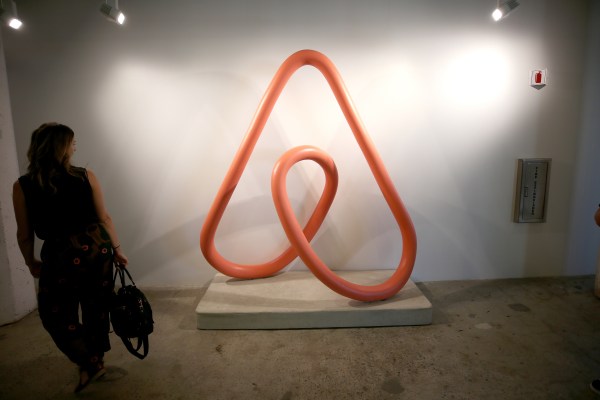Hello and welcome back to our regular morning look at private companies, public markets and the gray space in between.
This morning we’re tracking Airbnb’s latest losses, its anticipated and real Q1 revenue growth, and what the company’s current situation likely means for its public debut, something the company has promised will occur in 2020.
Last September, Airbnb told its investors, employees, and the world that it would begin to trade publicly in 2020, with the company widely expected to pursue a direct listing instead of a traditional IPO. Since then, the company’s persistent deficits have continued. And, unexpectedly, the world’s travel industry has become troubled in light of the spread of COVID-19, the resulting border closures and reduction in personal and business travel. Mix in a broad stock market selloff, and Airbnb is in a tricky spot.
It is too early to say that Airbnb will not float in 2020, but it’s not too early to say that a public listing in the first half of the year is out. Let’s explore why.
IPO dynamics
Public offerings are so sufficiently complex and tricky to execute well that many companies avoid debuting in election years, simply to avoid possibly unsettled markets; investors hate uncertainty, elections are uncertain, and so, in old-fashioned thinking, it’s better to go public in non-election years.
To the domestic markets, the COVID-19 pandemic is far more disruptive than an American election — and the virus has come during a presidential election year. Even more, it’s the re-election campaign of President Donald Trump, hardly a unifying figure in domestic politics. Any regular election chop, then, will likely be amplified in the current cycle.
Why, then, did Airbnb promise a public debut in 2020? There are a few reasons:
- It needs to provide liquidity to its investors and employees, individuals who have poured financial and human capital into the business for nearly 12 years.
- The company’s employee-granted restricted stock units (RSUs) have timers on them, and the company wanted to “go public by mid-2020 to give the firm enough breathing room to ensure the RSUs won’t be affected,” according to The Information.
- Finally, Airbnb likely wanted to go public before the public markets or the broader economy turned, leading to slimmer prices for growth-oriented shares like the equity it is expected to offer. A bit late now, of course, but the logic of going public in 2020 and not 2021 to avoid a slowdown wasn’t too bad when the company made the pledge.
Things have now changed. Let’s catch up.
Q4 2019
Bloomberg got its hands on Airbnb’s Q4 financial results, which we’ll digest below. Previously, TechCrunch has explored Airbnb’s known financial history. Today, we add to that roll.
In the fourth quarter of 2019, Bloomberg reports that Airbnb:
- Posted negative earnings before interest, taxes, depreciation, and amortization of $276.4 million (+92.4% YoY)
- It generated that adjusted loss against $1.1 billion in revenue (+32% YoY according to the article)
The same piece reports that Airbnb had about $2 billion in cash heading into Q1 2020 and expected to grow 25% in the first quarter of this year.
In 2019, using publicly reported information, it appears that Airbnb’s revenue grew to between $4.7 billion and $4.9 billion in the quarter, in line with the firm’s expectations. The company’s profitability is hard to calculate given the diversity of metrics supplied by differing media organizations reporting on the company—an S-1 would be lovely at this point.
Now let’s turn to Q1 2020.
Today
With Airbnb expecting 25% growth in Q1 2020 over its year-ago result (TechCrunch has heard the same percentage growth figure), the company expected revenue of about $1.05 billion in the period. Airbnb, per reporting, lost $306 million on an operating basis (a more strict measure than EBITDA) in Q1 2019.
The company’s prior profit projections for current quarter aren’t known, but whatever they were, they’re wrong.
Airbnb’s Q1 2020 will not perform to expectations, as the company’s bookings fall around the world. The WSJ notes that the company’s activity in China nearly zeroed-out in the first week of March, adding that the Italian and South Korean markets were sporting similar declines. The same WSJ piece also noted falling bookings in various U.S. markets before the nation began locking itself down over the past weekend. Things are likely even more bleak today.
Even if China got back up to 100% by the end of March, Airbnb would still suffer as the world traveling population is itself down. Airbnb will not post 25% growth in Q1 2020, and it’s not inconceivable that the firm could shrink instead.
The Future
Airbnb cannot go public with flat-to-falling revenues and, we’d presume, continued losses. Such an asset is worth very little, and surely not keeping with the firm’s private valuation of more than $30 billion. Could Airbnb grow in Q2 2020? Compared to the first quarter of this year, yes, but compared to Q2 2019? That’s not clear. So perhaps by the end of Q3, if Airbnb had a good period, it could debut on the back of a normal quarter and a return to real growth.
The company could file in November with its Q3 results tentatively booked and on display, showing a return to form.
But recall that election years are considered tough periods for public debuts. Our timing estimates indicate that the first time that Airbnb could be possibly ready to go public would be around the worst possible time for reasons external to the firm, COVID-19 aside, as the election this year comes in November.
Its next chance would be Q1 2021, but that’s too late for the firm to meet its promises to shareholders and protect employee RSUs.
So what does Airbnb do? I have no idea. But it’s hard to find an option for the firm that looks good at this point. It should have started trading publicly when it was profitable in 2018.
